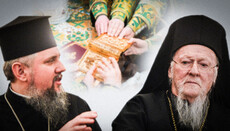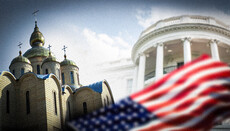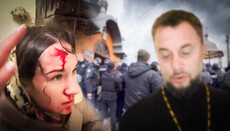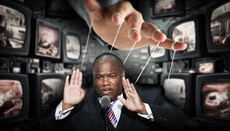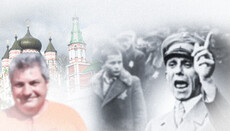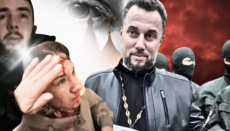UGCC head reveals his hand
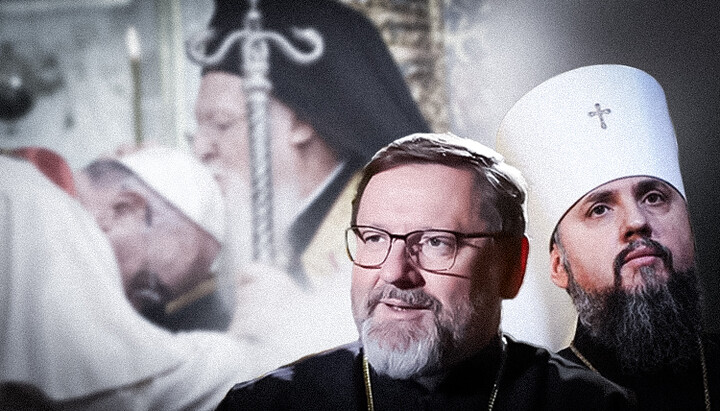
In a recent interview, the head of the UGCC, Sviatoslav Shevchuk, made several statements that help clarify what is happening and why the UOC is facing such persecution.
In early 2025, the Youtube channel RBC-Ukraine published an interview with the head of Ukrainian Catholics of the Orthodox rite, Sviatoslav Shevchuk.
One of the topics discussed was the possible unification of the Orthodox and Greek Catholics in Ukraine. The RBC-Ukraine hosts' introduction to this issue was quite revealing. One of them said the following: "Some time ago, I heard an assessment from one of the representatives of the current ruling team in an off-the-record conversation (not on record – Ed.), which suggested that this unification (of the Orthodox and Catholics – Ed.) is likely to happen, and we should strive for it. A time frame of 30 or 40 years from now was outlined."
It is not possible to confirm or deny these words from the unnamed official. The host mentioned that this person holds a very high position, but be that as it may, it is unlikely that anyone in power in Ukraine is thinking so far ahead. However, it is unquestionable that discussions about unification are taking place in the highest echelons of Ukrainian power. And Sviatoslav Shevchuk may be aware of this. Therefore, he hastened to assure his interlocutors that no negotiations about institutional unification are taking place. Quote: "Regarding potential unification, I would not be so optimistic and would not set any timeframes. Because today, I do not even see the beginning of any dialogue about unification. I would say that today, we are predominantly working on cooperation."
Shevchuk's deceit
Of course, Sviatoslav Shevchuk was dissembling when he claimed there was no dialogue about unification. Even before the creation of the OCU, the Greek Catholics viewed its emergence in the context of future unification processes. In April 2018, when the talks on the OCU creation between the Poroshenko administration and the Phanar were already in full swing, Shevchuk met with the then U.S. Ambassador to Ukraine, Marie Yovanovitch, and expressed his firm support for the OCU project. At that time, the head of the UGCC stated that the creation of the OCU was only the first step towards achieving unity among the "Churches of Vladimir's Baptism " in the "One Local Church of Kyiv", and that "the next step is an ecumenical dialogue between the UGCC and the united Ukrainian Orthodoxy aimed at restoring the original unity of this Church."
Here is what one of the key figures of the UGCC, the President of the Ukrainian Catholic University, Borys Gudziak, said in October 2018: "For Greek Catholics, it is important that when Ukrainian Orthodox Christians unite, there is hope that with one church, it will be easier to engage in theological, spiritual, and ecumenical dialogue."
In February 2019, that is, just a month after the creation of the OCU, the chairman of the UGCC Commission for Christian unity, Ihor Shaban, stated: "This also explains our current desire to start immediately the much-needed dialogue with our sister – the Orthodox Church of Ukraine. Searching for a way to restore unity within the currently divided Kyiv Church is a perfectly logical and legitimate process."
On 26 October 2021, representatives of the UGCC, the Phanar and the OCU held an international ecumenical conference in Kyiv titled "Catholic-Orthodox Documents and Their Reception in Ukraine". Speaking at this conference, S. Shevchuk said: "I think everything has been said here. The goal of ecumenical dialogue is not just to cooperate but to restore communion." So, when was S. Shevchuk lying: then or now? However, this is not so important.
"Deep processes" of unification
The key point to note in Sviatoslav Shevchuk's recent interview is that he believes the unification of the denominations should not be merely on an administrative level; rather, the OCU and the UGCC must achieve unity "in deep processes". He stated: "If we want to build merely institutional mechanisms without deep unifying movements, then they will either lack a foundation or give rise to some other church."
As is well known, the foundation of any religious union is its doctrine. People who declare their unity must profess the same dogmatic truths.
Shevchuk himself claimed in an interview with Donetsk television before the Euromaidan that the UGCC adhered to Orthodox doctrinal theology. However, the Ukrainian Uniate Church is merely a part of the Catholic Church, where Orthodox dogmas do not exist. It is easy to guess that such a blatantly false statement was simply Shevchuk's attempt to "conquer" the Eastern lands of Ukraine, where the UGCC had never been present.
Now, it seems the discussion is about Orthodox Christians accepting Catholic dogmas, the most prominent of which are the teaching on the procession of the Holy Spirit from the Son of God and the primacy of the Pope over all Christians. The Uniates themselves accepted these dogmas back in 1596 during the signing of the Union of Brest. From Orthodoxy, they retained only the external form, the ritual, and only due to the Pope's indulgence towards the Eastern "schismatics" (a term Catholics use for Orthodox Christians).
Here is a quote from the papal constitution “Magnus Dominus” of 21 January 1596, in which the Pope confirmed the union with the traitors of Orthodoxy from the Ukrainian lands of the Polish Commonwealth: "We hereby decree that we accept the venerable brothers, Michael the Archbishop – Metropolitan, and other Russian bishops with all their clergy and Russian people living in the lands of the Polish king, into the bosom of the Catholic Church, as our members in Christ. And as a testimony of such love for them, by apostolic favour, we permit and allow them to continue using all the sacred rites and ceremonies which they employ in the divine services and the most holy liturgy, as well as in the other sacraments and sacred rites, provided these rites do not contradict the truth and teachings of the Catholic faith and do not hinder communion with the Roman Church."
In other words, Shevchuk's statement about "deep processes" could indicate that within the global ecumenical movement between the Phanar and the Vatican, the discussion is not just about symbolic joint prayers or public statements, but about a true departure from Orthodox doctrine.
In early May 2023, Patriarch Bartholomew visited Italy. The visit's programme was quite eloquently titled: "Two Brothers, One Faith". Formally, this refers to the fact that both Rome and Constantinople consider the apostles Peter and Andrew to be the founders of their Christian communities. But it is also a hint towards Bartholomew and Francis, who have repeatedly referred to each other as brothers. But do they share the same faith?
In June 2023, Patriarch Bartholomew sent a letter to Pope Francis, which included the following words: "I am sure that as they walk this path together, Catholics and Orthodox will gain a deeper understanding of the ties that already bind them in faith, hope and charity, in order to be encouraged to persevere along this path leading to full and visible unity."
The possible model of "fundamental" unity
How can the Vatican and the Phanar come to a common faith? Apparently, the model in which doctrinal mutual understanding is declared would look something like this: the Catholic dogma of filioque ( the Holy Spirit proceeds from the Father and the Son) would simply be left aside, with the claim that the One Church tolerated this teaching for approximately 500 years during the first millennium. Eastern and some Western theologians wrote treatises against this doctrine, proponents of filioque responded, but the Church remained united. One could pretend that we are now returning to this state of affairs.
The dogma of papal supremacy is somewhat more complicated. But even this can be resolved. For example, the Orthodox would regard this supremacy as a primacy of honour, while Catholics would see it as a primacy of authority, but both would pretend to agree with each other. In February 2021, at a conference on Orthodox-Catholic dialogue "Challenges and Prospects of Orthodox-Catholic Theological Dialogue", Phanar hierarch Archbishop Job (Getcha) said that the problem is not with the primacy of the pope, but with how this primacy is to be implemented.
"The Orthodox have no problems with the primacy of the Roman Church since this Church, according to patristic and canonical traditions, presides in love ... Therefore, from the Orthodox point of view, the primacy of Rome is not a problem ... The question is how this primacy will be implemented in practice," Getcha said.
What ecumenism supporters prefer not to mention is that Catholics do not intend to revoke the anathemas on all those who do not accept the papal primacy as authority, nor on those who reject filioque. But aside from dogmatics, there are a huge number of other disagreements between the Orthodox and Catholics, ranging from completely different understandings of salvation to fundamentally differing views on the practice of prayer. This, no doubt, deserves a separate and more detailed discussion.
Here, however, let us focus on another remark made by Sviatoslav Shevchuk in his interview with RBK-Ukraine: "Our programme for seeking unity among the Christians of Ukraine aims at implementing at the local level those agreements that have already been reached between the Catholic and Orthodox Churches at the universal level."
Shevchuk spoke about the work of the joint Phanar-Vatican commission led by Archbishop Job (Getcha) and Cardinal Kurt Koch. The head of the UGCC stated that the UGCC’s representative, Ivan Datsko, is also involved in the commission's work. However, the OCU does not have any representatives in the commission because the OCU has not yet been recognised by the other Local Orthodox Churches. But when, as Shevchuk says, the OCU is recognised, "then what has been achieved there (between Rome and the Phanar – Ed.) we will be able to successfully implement here, at the level of Ukraine."
The bottom line
From all of this, the following picture emerges.
Firstly, some agreements have already been "reached" between the Vatican and the Phanar, which we do not yet know about but can only speculate on. Secondly, these agreements are meant to be implemented "at the level of Ukraine". That is,
Ukraine is being viewed as a testing ground for the ecumenical agreements between Pope Francis and Patriarch Bartholomew.
The UGCC and the OCU are to conduct a "test drive" of these already-reached agreements. Thirdly, the implementation of this process is hindered by the fact that the OCU is not recognised by many Local Orthodox Churches.
One might then ask a simple question: what is preventing the Local Churches from recognising the OCU? Mainly, the fact that the Ukrainian Orthodox Church is not part of the OCU project. Had the UOC agreed, the issue of the non-canonicity of the episcopal ordinations in the OCU would not be perceived so acutely, and Patriarch Bartholomew's abuse of authority would be turned a blind eye, and many other issues would have been resolved. In that case, the scheme for uniting the Orthodox and Catholics, as voiced by Shevchuk, could already have been realised.
Could this be a reason why Volodymyr Zelensky has so dramatically transformed from someone who, at the beginning of his presidency, promised not to interfere in religious affairs into a fierce persecutor of the Church of Christ? Is this why the persecution of the UOC and its portrayal as the enemy of the people was initiated?
It seems that the steadfastness of the UOC in its faith and its unwillingness to bow to the powerful of this world is the last bastion standing in the way of the Catholicisation of Ukraine. What Polish nobles failed to achieve in the 16th and 17th centuries, the current Ukrainian authorities hope to accomplish today. The only difference is that the Poles back then were devout Catholics and were carrying out the Pope’s task of "saving the Eastern schismatics". Today, the union with the Orthodox of Ukraine is needed to inject fresh blood into the decaying body of the Vatican, which is rapidly losing its authority and congregants in Europe. It is also needed by Patriarch Bartholomew – to consolidate his status as "First" in Orthodoxy.
But all this is about politics, not faith. However, it sheds light on what is happening around the UOC today.
It is high time to finally admit honestly: the Church in Ukraine has not been persecuted because it is allegedly part of the Russian Orthodox Church, nor because it is allegedly insufficiently patriotic, but because it remains faithful to Orthodoxy.
